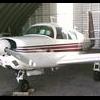Thanks for all the input. You never know when a condition may rise that you may have to run a tank dry. I've been flying a Mooney IFR for over 15 years and have not yet ran a tank dry. My IFR instructor owned a Mooney with over 5K hours and did it all the time. My attitude was why risk it. I've deadsticked a plane in before due to a blown exhaust valve and believe any emergency landing can be successful. An old FAA investigator told me many years ago there are 3 things that will keep you alive while flying, first fly high (more options and a lot of time for planning and troubleshooting), don't fly at night (can't see to land), last don't fly through thunderstorms. I came back from the West coast a few days ago, non-stop. I managed my fuel leaving 5-6 gallons on left and 6-7 on the right. I would hate to think that if I came in to land and had an emergency landing due to a fuel problem while in a bank and the POH had a run tank dry procedures it could be used against me. I have read many NTSB reports and in a problem described the investigator could report that the pilot did not follow the POH and had they, a fuel problem related to an accident described would not have occurred. I plan on writing a procedure to run my tank dry should I ever need use it. Another situation I see is if flying over forecasted IFR that turned to unexpected LIFR. I think I would run a tank dry to maximize my burn rate rather than land in LIFR. Of course it would be good to make a trail run first. Flying over open water is another flight I make about twice a year, offshore as much as 150 miles. Unexpected head winds could require maximizing the burn rate. I've always believed landing in water is much better than the ground especially around Southern Mississippi and Alabama where there are nothing but trees. I would choose open water any day. Oh yes, I have life jackets, emergency gear, and mobile waterproof elt when flying over open water. Actually I put the life jacket on as soon as I get over water. Risk mitigation was stated before and that pretty much sums it up for me. You never know if you might have to run a tank dry, thanks for every ones input I know I would be better prepared.



